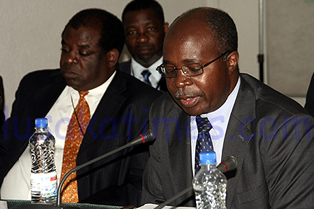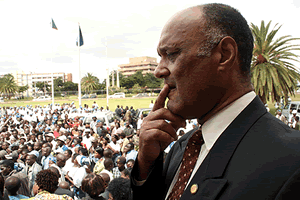
following indication that China will this year increase its
annual copper purchase from 600,000 to one million
tonnes, Finance and National Planning Minister,
Situmbeko Musokotwane has said.
Dr Musokotwane said in Lusaka yesterday that if implemented, China’s move would result in a deficit in the global copper requirement for 2009 and trigger higher prices.
The minister said this in a speech read for him by Secretary to the Treasury, Likolo Ndalamei during the second Corporate Governance award-giving ceremony held at Hotel Intercontinental.
Dr Musokotwane said despite having put in place various measures to support economic diversification, the Zambian Government would not abandon what it knew best: mining.
“This is the reason why we are optimistic with reports that China’s State Reserve Bureau may this year raise purchases of copper to one million metric tonnes from 600,000 tonnes.
“Such a measure, if implemented, ‘would easily turn the projected global surplus of between 350,000 tonnes and 400,000 tonnes this year’ into a deficit. This is an encouraging signal for the Zambian mining industry,” he said.
Dr Situmbeko said that Government was equally positive about the future copper prices, which had gained by 25 per cent on the London Metal Exchange (LME) within this year after falling by 54 per cent last year.
Currently, he said, the price stood at around US$3,862 per tonne after China’s copper imports jumped by 55 per cent last month. This price level is the highest since November 2008.
He, however, noted that in the 2009 budget, Government had put in place programmes to diversify the economy and increase the potential for wealth creation through agriculture, tourism and manufacturing.
Dr Musokotwane said his ministry would this year address some challenges faced in the governance of State-owned-enterprises some of which had been a drain on national coffers.
“To forestall this trend and improve overall performance, my ministry will reinforce measures aimed at improving oversight, supervision, general management, corporate governance, quality systems and service delivery in State-owned enterprises.
“In this regard, I am pleased to inform you that we have provided K2 billion in this year’s budget for strengthening the implementation of the automated trading system on the Lusaka Stock Exchange (LuSE),” he said
He said the growth of market capitalization on the LuSE over the last few years gave government hope that the market in Zambia, though experiencing a momentary reduction, was sustainable and a worthy choice for stock investments.
Dr Musokotwane noted that although share prices might have fallen, the overall performance of most listed companies had been satisfactory and was a testimony of the resilience of Zambia’s economy.
“The evidence of our market attractiveness is manifested by looking back at 2008 when K1.302 trillion was raised in seven issues on the Lusaka Stock Exchange. This means that on average, the LuSE market capitalisation grew from K13.07 trillion or US$ 3.188 billion in 2007 to K24.205 trillion or US$ 6.538 billion in 2008.
“As a result, market capitalisation to GDP ratio also grew from 40 per cent to 61 per cent. This scenario makes the Lusaka Stock Exchange an illustration of the stability of our economy and a demonstration of the depth of private sector development in Zambia,” he said.
[Times of Zambia]




